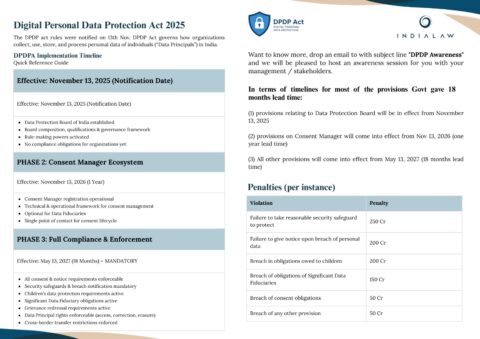Companies (Amendment) Bill 2014
By Saurav Agarwal & Nischay Nagarwal
The Companies (Amendment) Bill 2014[1] (“Bill”) was passed by Lok Sabha on 17th December 2014 in Parliament to make certain amendments in the Companies Act, 2013.
The Companies Act, 2013 (“Act”) was notified on 29 August, 2013. Out of 470 sections in the Act, 283 sections and 22 sets of Rules corresponding to such sections have so far been brought into force.
The Bill, which is prepared to come into force from 1 April 2015, has been approved by the lok Sabha and is now pending the approval of the Rajya Sabha.
The Bill introduced the following changes in the Act:
- Omission of minimum paid-up share capital:
According to Sections 2(68) and 2(71) of the Act, minimum paid-up share capital required for private company and public company are 1 lakh and 5 lakh respectively. These limits of paid-up capital have been removed in the Bill. Hence, Company can be incorporated with any capital like limited liability partnership and also it will lower the registration cost.
- Making Common Seal optional:
After the Amendment, Common Seal prescribed under sections 12, 46 and 105 of the Companies Act, 2013 will be optional to lower the procedural difficulties in the matters of company.
- Prescription of Specific Punishments for Deposits accepted:
Where a company accepts deposit in contravention of the manner or the conditions prescribed under section 73 or section 76 or rules made there under or if a company fails to repay the deposit or part thereof or any interest due thereon within the time, then:
(a) the company shall be punishable with fine which shall not be less than one crore rupees but which may extend to ten crore rupees;
(b) every officer of the company who is in default shall be punishable with imprisonment which may extend to seven years or with fine which shall not be less than twenty five lakh rupees but which may extend to two crore rupees, or with both.
- Restriction on right to inspect copies of Board resolutions filed with the Registrar of Companies (“ROC”):
Pursuant to Section 117 of the Act, Companies are required to file copy of every board resolution with ROC within 30 days of passing such resolution. Section 399 of the Act further provides that such documents filed with the ROC shall be available for public inspection. The Bill proposes that resolution filed with the ROC shall not be available for inspection by general public. This will protect the confidentiality of the Board discussions.
- Inclusion of provision for writing off past losses/depreciation before declaring dividend for the year:
The Bill proposes to insert a new proviso in Section 123 of the Act to provide that no company shall declare dividend unless carried over losses and depreciation of previous years are set off against profit of the company for the current year. This provision was prescribed in the rule 3 of Companies (Declaration and Payment of Dividend) Rules, 2014 and was missed in the statute. By this Amendment this will be brought in the Companies Act.
- Rectification of the Requirement of transferring Equity Shares:
Section 124 of the Act provides that where a dividend declared by a company has not been paid to or claimed by a shareholder for a period of seven years, such dividend will be transferred to the Investor Education and Protection Fund (“IEPF”). The section also provided that in such cases those shares will also be transferred to IEPF. The Bill clarifies that the Shares will be transferred to IEPL only if the dividend has not been paid/ claimed for consecutive period of seven years. In other words, shares will not be transferred if dividend has been paid or claimed on any occasion during the span of seven years.
- Prescription of Thresholds beyond which Fraud shall be reported to the Central Government:
As per the section 143(12) of the Act, auditors of the company had to report to the Central Government any kind of fraud or illegality, irrespective of the amounts involved. The Amendment proposes to replace the provision thereby requiring the auditor to report to the Central Government instances of fraud committed of a prescribed amount. Frauds involving lesser amount need to be reported only to the Company. Hence, Government can cure bigger scams by taking proper steps.
- Exemption u/s 185 (Loans to Directors) provided for loans to wholly owned subsidiaries and guarantees/securities on loans taken from banks by subsidiaries:
The Act imposes restriction on loans by the company to its directors or other person in whom the director is interested. The Bill relaxes this restriction and exempts holding company from the requirements if it is providing loan or guarantees on behalf of wholly owned subsidiaries.
- Empowering Audit Committee to give omnibus approvals for related party transactions on annual basis:
Aligning with the clause 49 of SEBI Listing Agreement, the Bill proposes to amend Section 177 of the Act whereby the audit committee shall have power to give omnibus approvals for related party transactions on annual basis. Presently, any related party transaction and any subsequent modification to these transactions requires approval of the audit committee.
- Replacement of ‘special resolution’ with ‘ordinary resolution’ for approval of related party transactions by non-related shareholders:
The Bill proposes ordinary resolution for related party transactions under section 188 of the Act as against special resolution. Further no such resolution will required for a holding company to enter into a related party transaction with its wholly owned subsidiary company. Earlier, related party transactions required the approval of the non-related parties. The Bill proposes to do away with this requirement.
- Bail restrictions to apply only for offence relating to fraud u/s 447:
The Bill proposes to limit bail restrictions mentioned in Section 212 of the Act only to offence relating fraud mentioned under Section 447.
- Winding Up cases to be heard by 2-member Bench instead of a 3-member Bench:
As per section 419(4) of the Act, cases regarding rehabilitation, restructuring and winding up are disposed of by 3-member bench. This 3-member bench will be substituted by 2-member bench to avoid the practical difficulties in the new Amendment.
- Special Courts to try only offences carrying imprisonment of two years or more.
Section 436 of the Act envisaged that Special Courts will try all offences irrespective of punishments. The Bill proposes to reduce the burden on Special Courts by providing that only offences carrying imprisonment of two years or more will be tried in Special Court.
[1] http://www.prsindia.org/uploads/media/Company/Companies%20%28A%29%20Bill,%202014.pdf
By entering the email address you agree to our Privacy Policy.



